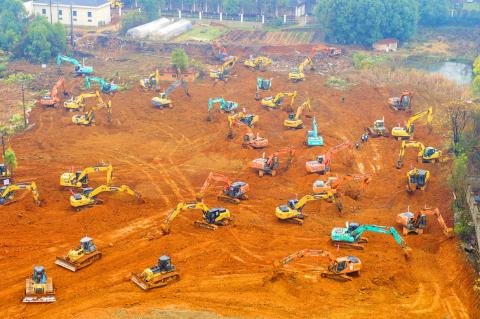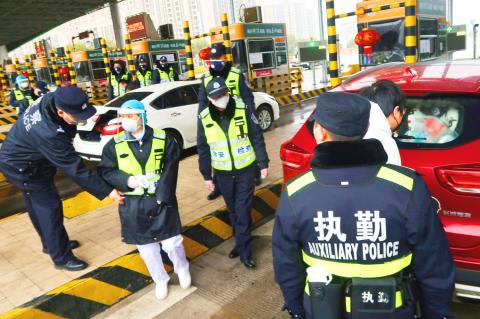Chinese authorities yesterday expanded their mammoth quarantine effort to 13 cities and a staggering 41 million people, as nervous residents were checked for fevers and the death toll from the 2019 novel coronavirus (2019-nCoV) climbed to 26.
A range of Lunar New Year festivities have been canceled, while temporary closures of Beijing’s Forbidden City, Shanghai Disneyland and a section of the Great Wall were announced.
The WHO said China faced a national emergency, but stopped short of making a declaration that would have prompted greater global cooperation, including possible trade and travel restrictions.

Photo: AP / Chinatopix
With hundreds of millions of people on the move across China for the Lunar New Year holiday, the government has halted all travel out of Wuhan, shut down its public transport and told residents to stay at home.
Normally bustling streets, malls and other public spaces were eerily quiet in Wuhan on the second day of its lockdown.
Masks were mandatory in public, and images from the city showed empty shelves as people stocked up for what could be an extended isolation.

Photo: Reuters
Train stations, the airport and subways were closed; police checked incoming vehicles, but did not entirely close off roads.
Hospitals visited by journalists bustled with worried patients being screened by staff wearing full-body protective suits.
At a temperature-check station, a medical staffer in bodysuit, mask and goggles took a thermometer from a middle-aged woman, pausing to examine the reading before quickly turning back to the patient.
“Have you registered? Then go and see the doctor,” the staffer said.
One 35-year-old man surnamed Li voiced the fears of many.
“I have a fever and cough, so I’m worried that I’m infected,” he said. “I don’t know the results yet.”
A taxi driver in Wuhan, who asked not to be named, said: “This year we have a very scary Chinese New Year. People are not going outside because of the virus.”
However, a prolonged shutdown should not pose food-shortage problems because many people had stocked up for the holiday, he said.
In addition to Wuhan, 12 other smaller cities nearby have battened down the hatches, with most of them going public yesterday with various measures ranging from closing public venues and restricting large gatherings, to halting public transportation and asking citizens not to leave their cities.
As reports surfaced of bed shortages in Wuhan hospitals, state media said authorities were rushing to build a new facility devoted to the outbreak by Feb 3.
It is to have a capacity of 1,000 beds spread over 25,000m2, Xinhua news agency said.
Dozens of excavators and trucks were filmed working on the site by state television.
Xiaotangshan Hospital was erected on the outskirts of Beijing in barely a week in 2003 to cater to a rapidly rising number of SARS patients.
It consisted of prefabricated structures and Xinhua said Wuhan was building the new facility based on the same model.
China Central Television reported that 40 medical doctors from the military were being brought in to help with intensive care at Wuhan Pulmonary Hospital.
Chinese authorities said the number of cases leapt overnight to more than 800, with 177 in serious condition. There were another 1,072 suspected cases.
Officials also said that a virus patient died in Heilongjiang Province, the second death outside Wuhan.
Beijing has canceled popular New Year public events at temples in the capital, the historic Forbidden City is to close from today, and Shanghai Disneyland said it would also shut today for an indefinite period to protect visitors and staff.
To discourage travel, the government has said all tickets for rail, air, road or water transport could be exchanged for a refund.

The CIA has a message for Chinese government officials worried about their place in Chinese President Xi Jinping’s (習近平) government: Come work with us. The agency released two Mandarin-language videos on social media on Thursday inviting disgruntled officials to contact the CIA. The recruitment videos posted on YouTube and X racked up more than 5 million views combined in their first day. The outreach comes as CIA Director John Ratcliffe has vowed to boost the agency’s use of intelligence from human sources and its focus on China, which has recently targeted US officials with its own espionage operations. The videos are “aimed at

STEADFAST FRIEND: The bills encourage increased Taiwan-US engagement and address China’s distortion of UN Resolution 2758 to isolate Taiwan internationally The Presidential Office yesterday thanked the US House of Representatives for unanimously passing two Taiwan-related bills highlighting its solid support for Taiwan’s democracy and global participation, and for deepening bilateral relations. One of the bills, the Taiwan Assurance Implementation Act, requires the US Department of State to periodically review its guidelines for engagement with Taiwan, and report to the US Congress on the guidelines and plans to lift self-imposed limitations on US-Taiwan engagement. The other bill is the Taiwan International Solidarity Act, which clarifies that UN Resolution 2758 does not address the issue of the representation of Taiwan or its people in

US Indo-Pacific Commander Admiral Samuel Paparo on Friday expressed concern over the rate at which China is diversifying its military exercises, the Financial Times (FT) reported on Saturday. “The rates of change on the depth and breadth of their exercises is the one non-linear effect that I’ve seen in the last year that wakes me up at night or keeps me up at night,” Paparo was quoted by FT as saying while attending the annual Sedona Forum at the McCain Institute in Arizona. Paparo also expressed concern over the speed with which China was expanding its military. While the US

SHIFT: Taiwan’s better-than-expected first-quarter GDP and signs of weakness in the US have driven global capital back to emerging markets, the central bank head said The central bank yesterday blamed market speculation for the steep rise in the local currency, and urged exporters and financial institutions to stay calm and stop panic sell-offs to avoid hurting their own profitability. The nation’s top monetary policymaker said that it would step in, if necessary, to maintain order and stability in the foreign exchange market. The remarks came as the NT dollar yesterday closed up NT$0.919 to NT$30.145 against the US dollar in Taipei trading, after rising as high as NT$29.59 in intraday trading. The local currency has surged 5.85 percent against the greenback over the past two sessions, central